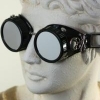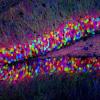
Turmeric as a teeth whitener? Really?
#31
Posted 04 December 2012 - 12:50 PM
#32
Posted 05 December 2012 - 03:20 PM
#33
Posted 05 December 2012 - 05:55 PM
I went to the dentist for a scheduled cleaning this morning and they were astounded, not only by how much whiter my teeth were, but at how much healthier my gums were. The cleaning took no time at all.
Someone should make a gum:
Gum Base, Xylitol, Turmeric, Calcium Lactate
(no other sweeteners, and no titanium dioxide please).
Longecity Gum?
sponsored ad
#34
Posted 09 December 2012 - 04:37 AM
#35
Posted 09 December 2012 - 05:10 AM
#36
Posted 09 December 2012 - 05:17 AM
Turmeric rice is not bad. It is also used in curries.
#37
Posted 09 December 2012 - 05:27 AM
#38
Posted 14 December 2012 - 02:54 AM
I decided to do a little publication research, and found this paper explaining the possible cause of action for all of this. It may also explain why the whitening results seem to be somewhat temporary a day or so later after brushing, as the bacteria recolonize on the surface afterwards.
Full paper:
 Curcumin suppresses Streptococcus mutans adherence.pdf 376.19KB
12 downloads
Curcumin suppresses Streptococcus mutans adherence.pdf 376.19KB
12 downloadshttp://www.ncbi.nlm....pubmed/22009290
Abstract
Streptococcus mutans is the key causative agent of caries and infective endocarditis. The first step in biofilm development and the consequent initiation of further disease is bacterial adherence to host cell surfaces. Therefore, the aim of this study was to evaluate the inhibitory effect of curcumin on S. mutans adherence to extracellular matrices and tooth surfaces. The effect of curcumin on the ability of S. mutans to adhere to glass surfaces coated with collagen and fibronectin was tested in order to determine whether the decrease of the bacterial adhesion by curcumin is achieved by hindering the bacteria in adhering to collagen and/or fibronectin. Also, human teeth inoculated with S. mutans were treated with curcumin in vitro in order to assess the relevance of the anti-adhesive effect to oral conditions in vivo. The minimum inhibitory concentration (MIC) at which curcumin completely inhibited bacterial growth was 128 μg/mL. The addition of curcumin below the MIC diminished bacterial adherence onto both collagen- and fibronectin-coated glass surfaces and human tooth surfaces. It appears that the anti-adhesive effect of curcumin against S. mutans is mediated through collagen and fibronectin.
#39
Posted 28 January 2013 - 12:28 AM
In terms of the health of my teeth, they are very good. I brush and floss regularly and use mouthwash. From the post above mine, removing bacteria won't make my teeth any whiter, and I have no tartar at all. My teeth are yellow and brown (especially at the edges) from staining. I drink a lot of tea and red wine, and over time these stains build up. The toothbrush doesn't remove them (not abrasive enough) and whitening toothpastes do nothing. It's not that the teeth aren't white, it's that they have surface stains on them.
I will see the hygienist for a cleaning in a couple of months (looooong overdue, this is the worst my teeth have ever been stained). Afterwards I might try the turmeric again, but I would still be doubtful. What is the actual mechanism of action? It doesn't remove stains, I've tested that. But after my stains have been removed by the hygienist, the only thing stopping my teeth from being very white will be the natural yellow colour of my dentine and thickness/translucency of my enamel allowing the dentine to show through. I doubt turmeric will make my dentine less yellow or make my enamel thicker.
#40
Posted 28 January 2013 - 01:36 AM
IME this works better for tannin stainingThis did nothing for me. I just have a yellow toothbrush now. But I would have been very surprised if it did work.
In terms of the health of my teeth, they are very good. I brush and floss regularly and use mouthwash. From the post above mine, removing bacteria won't make my teeth any whiter, and I have no tartar at all. My teeth are yellow and brown (especially at the edges) from staining. I drink a lot of tea and red wine, and over time these stains build up. The toothbrush doesn't remove them (not abrasive enough) and whitening toothpastes do nothing. It's not that the teeth aren't white, it's that they have surface stains on them.
I will see the hygienist for a cleaning in a couple of months (looooong overdue, this is the worst my teeth have ever been stained). Afterwards I might try the turmeric again, but I would still be doubtful. What is the actual mechanism of action? It doesn't remove stains, I've tested that. But after my stains have been removed by the hygienist, the only thing stopping my teeth from being very white will be the natural yellow colour of my dentine and thickness/translucency of my enamel allowing the dentine to show through. I doubt turmeric will make my dentine less yellow or make my enamel thicker.
http://www.crunchybe...ivated-charcoal
#41
Posted 01 February 2013 - 06:09 AM
I can't help thinking there must be some kind of ultrasonic or laser device that will separate the stains from the teeth harmlessly and float them away.
#42
Posted 01 February 2013 - 06:15 AM
#43
Posted 01 February 2013 - 06:55 AM
#44
Posted 04 February 2013 - 11:53 PM
#45
Posted 05 February 2013 - 04:19 PM
I tried activated carbon mixed with turmeric, and gave my teeth a greenish tinge. As for cleaning, I'd say turmeric by itself is better.IME this works better for tannin stainingThis did nothing for me. I just have a yellow toothbrush now. But I would have been very surprised if it did work.
In terms of the health of my teeth, they are very good. I brush and floss regularly and use mouthwash. From the post above mine, removing bacteria won't make my teeth any whiter, and I have no tartar at all. My teeth are yellow and brown (especially at the edges) from staining. I drink a lot of tea and red wine, and over time these stains build up. The toothbrush doesn't remove them (not abrasive enough) and whitening toothpastes do nothing. It's not that the teeth aren't white, it's that they have surface stains on them.
I will see the hygienist for a cleaning in a couple of months (looooong overdue, this is the worst my teeth have ever been stained). Afterwards I might try the turmeric again, but I would still be doubtful. What is the actual mechanism of action? It doesn't remove stains, I've tested that. But after my stains have been removed by the hygienist, the only thing stopping my teeth from being very white will be the natural yellow colour of my dentine and thickness/translucency of my enamel allowing the dentine to show through. I doubt turmeric will make my dentine less yellow or make my enamel thicker.
http://www.crunchybe...ivated-charcoal
#46
Posted 06 February 2013 - 10:49 PM
#47
Posted 07 February 2013 - 03:12 AM
#48
Posted 22 February 2013 - 08:00 PM
UGHHHHHH I remember trying activated charcoal for teeth whitening, not only it didn't work, it also darkened my mouth and chunks were stuck between teeth.I've tried both now. Bought some activated charcoal specially.
#49
Posted 22 February 2013 - 10:38 PM
I will definetely keep doing this.
oh and btw my toothbrush has gone totally yellow now!
#50
Posted 05 March 2013 - 05:43 PM
#51
Posted 26 May 2013 - 05:52 PM
#52
Posted 30 July 2013 - 09:57 AM
I've tried both now. Bought some activated charcoal specially. Neither made any immediate effect. My teeth have become whiter since, but I changed toothpaste and cut tea out. I think the last thing is what made the biggest difference. Black tea was just continually topping up the stains, and adding stains to the stains, which then readily attract more stains, and so on. Without it, brushing actually makes a difference over about a week. The worst brown stains remain at the edges where the brush struggles to reach; I think the dentist will have to remove those. I've found coffee stains teeth much less, and green tea less than black tea, though any tea is bad because of the tannins.
Why are tannins bad??
O yes, and thanks for this idea, will defo try this at home!!
#53
Posted 01 August 2013 - 06:45 AM
#54
Posted 01 August 2013 - 07:00 AM
BTW this is seriously not an April's fools day, isn't it??
#55
Posted 01 August 2013 - 07:24 AM
Edited by Luminosity, 01 August 2013 - 07:25 AM.
#56
Posted 01 August 2013 - 07:36 AM
#57
Posted 01 August 2013 - 01:22 PM
#58
Posted 11 August 2013 - 02:20 AM
I've been washing my teeth with turmeric + chewing turmeric for about two weeks now, I don't see any results. I have taken a picture of my teeth and will post pre-post pictures in two weeks (I will use turmeric until then).
What do you mean washing? You need to brush with the powder.
#59
Posted 11 August 2013 - 02:57 PM
#60
Posted 15 August 2013 - 12:45 AM
Volume 76, Issue 9, Article first published online: 9 NOV 2011
Abstract: Curcuma longa (C. longa) has been used as a spice in foods and as an antimicrobial in Oriental medicine. In this study, we evaluated the inhibitory effects of an essential oil isolated from C. longa on the cariogenic properties of Streptococcus mutans (S. mutans), which is an important bacterium in dental plaque and dental caries formation. First, the inhibitory effects of C. longa essential oil on the growth and acid production of S. mutans were tested. Next, the effect of C. longa essential oil on adhesion to saliva-coated hydroxyapatite beads (S-HAs) was investigated. C. longa essential oil inhibited the growth and acid production of S. mutans at concentrations from 0.5 to 4 mg/mL. The essential oil also exhibited significant inhibition of S. mutans adherence to S-HAs at concentrations higher than 0.5 mg/mL. S. mutans biofilm formation was determined by scanning electron microscopy (SEM) and safranin staining. The essential oil of C. longa inhibited the formation of S. mutans biofilms at concentrations higher than 0.5 mg/mL. The components of C. longa essential oil were then analyzed by GC and GC-MS, and the major components were α-turmerone (35.59%), germacrone (19.02%), α-zingiberene (8.74%), αr-turmerone (6.31%), trans-β-elemenone (5.65%), curlone (5.45%), and β-sesquiphellandrene (4.73%). These results suggest that C. longa may inhibit the cariogenic properties of S. mutans.
Attached Files
2 user(s) are reading this topic
0 members, 2 guests, 0 anonymous users


















































